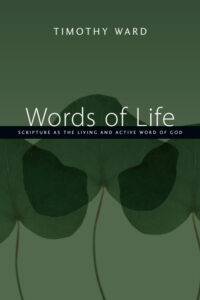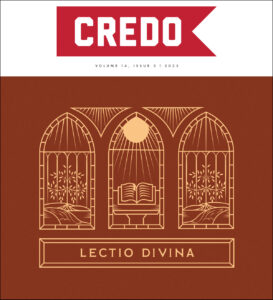I f you’re anything like me (and for your sake, I hope not in too many ways) then some of your favorite theological works have been written by folks in a different stream than the waters you swim in. Don’t get me wrong – I revisit some of my favorite Baptist brothers time and time again (shoutout John Gill, Matt Emerson & Matthew Barrett). But for some reason, many of my favorite works have been written by Evangelical Anglicans. Maybe it’s their reverent tone and serious thinking coupled with an avoidance of taking one’s self too seriously or because I read it to myself in a posh English accent when I am home alone. Whatever it is, I have a stack of Anglican resources that have shaped me tremendously.
f you’re anything like me (and for your sake, I hope not in too many ways) then some of your favorite theological works have been written by folks in a different stream than the waters you swim in. Don’t get me wrong – I revisit some of my favorite Baptist brothers time and time again (shoutout John Gill, Matt Emerson & Matthew Barrett). But for some reason, many of my favorite works have been written by Evangelical Anglicans. Maybe it’s their reverent tone and serious thinking coupled with an avoidance of taking one’s self too seriously or because I read it to myself in a posh English accent when I am home alone. Whatever it is, I have a stack of Anglican resources that have shaped me tremendously.
Timothy Ward’s Words of Life is a contribution to that stack. Ward’s purpose for the book is clear from the start: in this short work on the doctrine of Scripture, Ward is “attempting to describe the nature of the relationship between God and Scripture” (11). Right away this sets Ward’s volume apart from most resources on the Bible. He does deal with the traditional attributes of Scripture but only after he has understood those attributes in light of what the Bible actually is: the Word of God.
Ward demonstrates to the reader how the Scriptures are God’s Word and how this divine communication is the Triune God’s chosen means of extending His covenant to His elect through the Son and by the Spirit. Furthermore, he spends the last chapter showing how Scripture plays the supreme role in our spiritual formation. Since this review is appearing in an issue related to Lectio Divina, I’ll spend the latter half examining Ward’s last chapter and the role of the Bible in our corporate and personal spiritual formation.
God’s Speech-Act
In direct contrast to the liberal scholar who divorces God from the Scriptures, Ward shows through the Old and New Testament that there is an intimate connection between God’s words and God’s actions. Ward holds that the Bible does not merely contain the words of God or point to the word of God, but it is the Word of God because it is God’s Speech-Act. As Ward says, “To encounter the words of Scripture, is to encounter God in action” (48).
When God’s commands have been set aside, “God himself has been set aside.” Click To Tweet Ward points out that the Old and New Testament frequently equate God’s words with God’s actions, communicating that these are in effect one and the same thing (20, 26). God, “by his very nature, acts by speaking.” The Garden of Eden demonstrates that the relationship between God’s Word and God’s Person is an “astoundingly close relationship.” When Adam and Eve defy and rebel against “God’s spoken command, they fracture their relationship with God Himself” because when God’s commands have been set aside, “God himself has been set aside” (27). Furthermore, when Jesus in John 6:63 states that His words are full of the Spirit and life, Jesus is equating His Words with the very words and action of God, which are full of the Spirit and life. His words are not simple speech but the intentional activity of God.
Communicating His Covenant
It is impossible, however, to be in a relationship with a Speech-Act alone. Instead, Ward shows that the content of God’s speech-act is the initiation of His presence through the extension of a covenant. The Triune God chooses to draw near to His people by graciously delivering a covenant to them through human language. It is by the words of the covenant that “he speaks to his people…and makes himself knowable to humanity” (30). This is why God identifies Himself to his people as the God of Abraham, Isaac, and Jacob: He is “the God who makes and keeps His covenant with His people” (30).
Ward points out that this seems to be the normal pattern for God’s redemptive activity in the Scriptures. He initiates His actions of redemption by a revelation of Himself through a Speech-Act and the communication of His covenant. Then it is only by embracing these words of the covenant by faith that His people can draw near to the God who draws near to them. Once His people have experienced His redemption and are in relationship with the God of the Covenant, God enacts religious ceremonies to rehearse God’s redemption for their minds and hearts. They aren’t meant to only experience it once but to retell His covenant to one another again and again (30).
Furthermore, God’s covenant is the way He initiates His presence with His people. This is because, “God’s words in some way convey his presence” (30). Ward points out that it is through the words of the covenant that God “makes himself knowable to humanity” through the ordinary means of human language. In some beautiful and mysterious way God’s actions and verbal actions “are an extension of Him” (30). Therefore, to embrace His words is to embrace Him, and to reject His words is to reject Him.
These two ideas of God’s speech-act and the communication of His covenant lay the groundwork for what Ward will discuss for much of the book. He spends chapters two and three discussing the relationship between the Trinity and the Bible and the full host of Scripture’s attributes. For the purpose of this review, however, we’ll next turn our attention to how Ward understands the role of Scripture in the Christian life.
The Bible and our Spiritual Formation
Discussing the role of the Bible in our spiritual formation is a trickier topic than it might seem at first glance. All Christians would agree the Bible plays some role in our sanctification, but many would disagree on the extent. A theologically conservative approach may see the Bible as not just the primary but the sole means by which a person is formed in the faith (“no creed but the Bible!”). On the other hand, a more theologically liberal approach may agree that the Bible is important to our formation but may place other formative elements as equal to – if not more important than – the Scriptures (“what’s your Enneagram?”).
Preaching is not merely the theological musings of the pastor, but is a Spirit-wrought activity to corporately shape the people of God. Click To Tweet Ward, however, does not fall into the trappings of either side. Instead, he holds the Reformation principle of Sola Scriptura which ensures that all other elements of formation (traditions, specifically) “serve Scripture, the supreme authority, rather than compete with it. Sola Scriptura means ‘Scripture supreme’” (151). Specifically, Ward demonstrates that the Scriptures are the supreme element in our spiritual formation both corporately and personally.
Corporate Formation
Some may ask, “Why discuss the role of the Scriptures and spiritual formation in the corporate sense at all? Isn’t it enough to practice the discipline of personal Bible reading?”
To that sentiment, Ward says the following:
I would suggest that the healthiest way to relate the two (corporate and individual Scripture reading) is to think of the individual reading of Scripture as derivative of, and dependent on, the corporate reading and proclamation of Scripture in the Christian assembly (171).
For Ward, the individual practice of Bible reading is linked with Bible reading that takes place in the public assembly. Although he would say that practices such as Scripture reading, recitation of creeds, hymns & liturgy, and the Lord’s Supper all contribute to the corporate formation of the Body of Christ, he identifies preaching as the primary means by which God forms His people by His Word. This is because preaching is not merely the theological musings of the pastor, but is a Spirit-wrought activity to corporately shape the people of God.
In preaching the Spirit speaks through a Spirit-given Word, by means of a Spirit-formed preacher to a Spirit-indwelt people…Preaching is the moment of truth in the life of the Christian community. The Spirit who dwells in the people also stands outside them, speaking through the Scriptures he has previously authored, in order to call them to be faithful to the work he has begun in them…Preaching is therefore part of the spiritual means by which God sends his Spirit on to and into us, in order to bring us into union with Christ, and to keep us within his covenant people (169).
In the gathered assembly, God repeats His covenantal speech-act by a Spirit-filled preacher, to a Spirit-filled people as He calls them to Himself and shapes them into Christ-likeness. In this act, God Himself “performs again for the congregation the covenant promise he made in the Scriptures” (170).
Personal Formation
When the Scriptures shape us corporately, private Bible reading is no longer “private” but done in unity with my fellow spiritual siblings and in light of the teaching of the church – even though I may not be in the same room as them at the moment. This is contrary to the individualist tendency of our day that may divorce personal spiritual formation practices from corporate practices entirely. Instead, Ward holds out that healthy personal Bible reading is best done under the church’s instruction and in light of the church’s conclusions.
The church teaches us how to read the Bible well when we’re reading it on our own. We can learn from the preacher how to uncover a passage’s meaning and seek to do so the same way in our own study. Additionally, we can seek to harmonize our interpretations of Scripture with the voices of our brothers and sisters before us since the passages of Scripture we read privately have “been read, prayed over, wrestled with, talked about and taught for two millennia before any of us were born” (173). This creates humility within us and keeps us from veering off into murky theological waters by saying something different than the church has said for two thousand years.
The effect of our corporate formation on our personal formation does not, however, remove the personal element of private Bible reading. Ward shares three questions we ought to use to help us govern our personal interpretations in light of the intended message of God’s speech-act.
- What is the Lord teaching me here?
Ward helpfully points out that this question keeps us from making Scripture into an idol that “simply reflects our own desires and prejudices” (175). If we do not seek out what God may be teaching us in Scripture, then we may be prone to stringing together a few ideas and make them mean what we’d like them to mean – rather than seeking out “what God has made them to mean in the Scriptures he authored” (175). This keeps us from placing ourselves as the highest interpretive authority and humbles us into the posture of a learner. However, we cannot stop after this question. If we do, then we may become too focused on the content of the Scriptures over and against its purpose. Which is why we must add another question.
- What is God wanting to do to me, and in me, through the words I am reading?
Because the Bible is God in action through His words, then God is intending for the words we’re reading to have an effect on us. Primarily, “as we encounter His words, and as we encounter the actions he performs by means of them, we are encountering God himself” (175). Above all else, God wants us to encounter Him through His word. Additionally, we have to seek out what the content of Scripture is intending to do within us. We ought not be content with learning the content of Scripture while “refusing to let God act in us with that truth as the sharp sword he intended it to be” (175). This leads us to ask the final question:
- What should I do when I encounter words spoken by God?
Ward’s doctrine of Scripture teaches that the most crucial element for interacting with the Scriptures is humility. We do not stand over the text and demand it to say what we wish, nor do we deny the message we read from it. Instead, we, “submit our thoughts, hopes and desires to God’s thoughts and his will, which he communicates to us in Scripture. We should set aside what seems to us to be true, in order to listen to the truthful and life-giving word of God” (176).
Conclusion
This short volume on the Bible is a helpful and unique contribution to recent works on the doctrine of Scripture. Much has been written on the attributes of Scripture, the origins of the Bible, or various ways the Bible attests to its own uniqueness. While all of these are essential, this volume is unique among them because it does not merely indicate that the Bible is God’s Word but attempts to communicate how the Bible is God’s Word. Such an attempt is in and of itself a difficult thing since we’re speaking of glorious and mysterious things, but Ward’s concept of the Speech-Act is a helpful, category-shaping way to explain the relationship between God and Scripture. Additionally, Ward’s insights on the Bible’s role in our corporate and personal spiritual formation are instructive for our day. His emphasis on the corporate gathering – preaching especially – as the primary way God shapes our personal spiritual formation helps us to resist individualistic tendencies and to embrace the posture of humble learning through all of life as the norm for Christian living.
A potential weakness of this work comes not from what is said but a gap because of what isn’t said as frequently as it could be. The beauty of the Bible is not only that God acts by His words but that He reveals Himself by His words. Ward does say this, but the Speech-Act paradigm may unintentionally communicate that God is merely acting through His speech and not opening blind eyes to see Him. A helpful tweak may be to say that God both acts and reveals Himself through His speech. This would help eliminate potential confusion and show that we don’t enter into relationship with God’s words but with the God who is there and is not silent.


